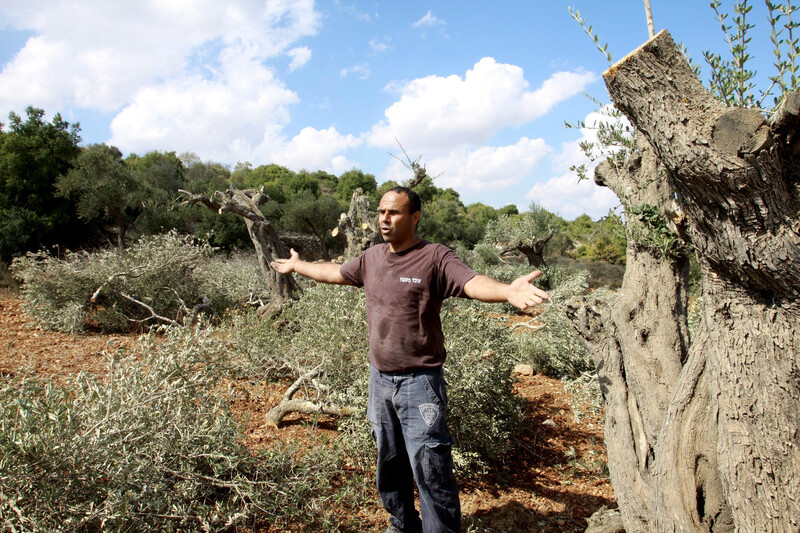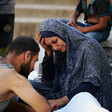The Electronic Intifada Podcast 2 November 2012

A Palestinian farmer in the occupied West Bank inspects his olive trees which were uprooted by Israeli settlers, 9 October 2012.
APA images“In this case, which we concluded was a co-production with the government of Israel against these Palestinian men, it lacked all legal precedent and common sense.” - Linda Moreno, co-counsel for Ghassan Elashi of the Holy Land Foundation
This week on The Electronic Intifada podcast:
- The US Supreme Court decides not to hear the case of five men convicted to decades in prison for their work with the Holy Land Foundation delivering charity to the occupied Gaza Strip; we’ll have an exclusive interview with attorney Linda Moreno about the court’s decision;
- The United Nations finds a “crisis of dignity” as Israeli settlers destroy or damage more than 1,000 Palestinian olive trees in the West Bank in October alone;
- Sounds from the new short documentary “Not a dreamland”, featuring artists and alternative subcultures in Gaza;
- News from the global boycott, divestment and sanctions movement as the Chair of the African National Congress backs the boycott, and declares that Israel has implemented a system “far worse than apartheid South Africa.”
Rush transcript: Linda Moreno, attorney for Ghassan Elashi of the Holy Land Foundation, 2 November 2012
The Electronic Intifada: Linda, if you could talk about your reaction as an attorney and as a member of the defense’s legal team to the decision of the Supreme Court this week.
Linda Moreno: Well, it was, I believe, for the lawyers, it was heartbreaking. We have been fighting for many years for the defense of these men in the Holy Land case. We went through two trials, appeals in the lower court, all the way up to the Supreme Court. And the Supreme Court decided against hearing our cert petition.
It was heartbreaking and it was another chapter in this case, a shameful chapter in this case, I would add, of the injustice of the Holy Land Foundation charity and the rule of law that has been violated in this case. We’ve analogized the Holy Land Foundation verdicts and the decision of the Supreme Court not to hear this very worthy appeal to the Korematsu and the Dred Scott decisions in the Supreme Court. Both decisions were lauded at the time, and applauded as being constitutional. We now know, decades later and centuries later for the Dred Scott decision, that this was a shameful, shameful chapter in our legal jurisprudence. And we think that the Holy Land Foundation [case] will be seen in the same light, in the same perspective in the future.
EI: What legal, social and political precedence does this set, in the current climate in the US when it comes to the expanding attacks, the surveillance, and the racism against Arabs and Muslims; and people who stand up for Palestinian rights?
LM: Well, I can certainly speak to the first … I can certainly speak to the legal aspect, and at the heart of our appeal, and at the heart of the convictions that we suffered in the second trial — and remember there were two trials, and in the first trial no one was convicted of any counts — in the second trial, the government had an anonymous expert testify, along with other anonymous witnesses. And what I mean by that is that witness’ anonymity even extended to the judge.
Nobody, not the defense, and not the judge, knew the identity of this witness who was allowed to testify. And really what that means is that there could be no effective cross-examination. If I don’t know your name, and I don’t know who you are, I can’t research you. I can’t find out if what you’re saying is true or not. It renders the right of cross-examination and confrontation meaningless. And this was the heart of our appeal to the Court. It is unprecedented in American jurisprudence that an expert has been allowed to testify anonymously.
I also want to say that really, in the Holy Land Foundation case, in my view anyway, I believe that Islam was criminalized. That the religion was criminalized at its heart. This case was about charity. It was about zakat. And the government conceded in this case that every penny that the Holy Land Foundation raised went to the needy. Not a nickel went to buy a bullet, a gun, or a weapon of any sort.
But the United States government decided it didn’t like the way it went to the needy — meaning that the donations were funneled through on-the-ground zakat committees to the needy. And these were zakat committees that were used by our government. USAID, the United Nations and NGOs had used these very same zakat committees. But in this case, which we concluded was a co-production with the government of Israel against these Palestinian men, it lacked all legal precedent and common sense.
And it held, I believe, the religion up to ridicule and perverted its meaning. And so, I don’t know, I can’t speak to the political aspects of this, but again we believe that the decision, the verdicts in the Holy Land are just another shameful chapter in our history.
EI: Linda, you represent Ghassan Elashi. Talk about his ordeal, and what his family has gone through, and his situation right now as he’s being held in this Communications Management Unit. Talk about what that looks like and what his day-to-day is like.
LM: Well, I mean, this is … I think that Michael Ratner of the Center for Constitutional Rights described these CMUs as prisons for Muslims. And that’s what they are. They are isolated, concrete graves. I just can’t be diplomatic about that.
Ghassan Elashi is one of my very favorite clients I’ve had in 32 years of criminal defense practice. He is a highly principled individual who, after receiving a sentence of 65 years for feeding Palestinian women and children, told the court boldly and bravely, I might add, that it was his honor to do so.
That’s who Ghassan Elashi was and is, and that’s who the rest of the gentlemen in the Holy Land case were. On the day-to-day basis, it is the worst kind of confinement imaginable, it’s solitary, the communications with the families are never contact visits — they’re through glass, and through the phone, email contact and phone contact is severely restricted. There are no worse places for confinement than these CMUs, which now has the Holy Land individuals in it.
It is the most unjust ending for what was a brilliant philanthropic career for Ghassan Elashi.
EI: And now of course we have to talk about the next steps and moving forward. The family and others have talked about now gathering steam and pressing towards exoneration and release. Talk about the logistics involved in that, and where the struggle is now.
LM: Well, I can’t really speak to exoneration. Legally, with respect to the courts, I believe that we’ve exhausted the legal direction. I believe there is a political direction. I have to leave it to others to really articulate that movement more aptly, because I’ve been so involved in the legal aspect of this case.
Certainly, the Holy Land Foundation case is the case that needs to be discussed, some of the lawyers on the team are going to be writing articles — not only legal articles but op-eds in papers around the world. This was a case that was followed by international charities because of its precedent-setting decisions in it. So this was a case that not only affected the Holy Land Five and their families, but it affected the notion of charitable giving around the world.
And it set a dangerous precedent that … if you’re a Muslim, if you cannot practice your zakat, you cannot practice your religion. So that is one casualty of this case. But in the general sense of charitable giving and donations, what this case stands for is if you are a person who donates out of good will, and this government decides that where your money lands might have gone through channels that they believe were associated with terrorist organizations, this is highly problematic.
This decision has negative, pervasive, wide-ranging consequences — not only to Muslims and their charitable giving, but to donations around the world. The families have suffered terribly, terribly. Not only materially, since the fathers are now all imprisoned, but emotionally and psychologically.
But I will say that being close to the Elashi family, and other families who have been victims of this kind of devastating prosecution, that I always marvel — I who am not a Muslim — I always marvel at what strength the faith gives these families.






Comments
Hypocrisy, as usual, in the system
Permalink David Evans replied on
The absolute hypocrisy in this case is glaring. While Pelosi's fundraiser furthered a just cause, so did the 5 who were unjustly railroaded by Zionists:
http://www.realnewsreporter.co...